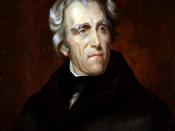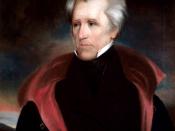By today's standards Andrew Jackson could be considered a tyrant. In most issues he was solely interested in attaining power and crushing those who opposed him. In the Indian Removal Act Jackson argued that the Cherokees were not an independent nation, and therefore had to do as he said. JacksonÃÂs interest in selling real estate was hypocritical since he supposedly hated the rich. Perhaps the key event was ignoring the Supreme Court order stating that the Cherokee could stay put. Jackson ignored the orders from the Supreme Court, and forced the Native Americans to relocate. The relocation resulted in over four thousand deaths - this is now referred to as the Trail of Tears. A violation of this proportion should have resulted in immediate impeachment, however he was a man of his times and there was not a lot of sympathy for Native Americans.
The author Robert V. Remini portrays Jackson quite realistically but his conclusions are sympathetic at best, wrong at worst.
Jackson learned early that his fits of rage could be used to his political advantage. He defended his wife's "honor" about 4 times in duels, one example being the scandalous rumors that were dispensed to the public during his presidential campaigns. The Peggy Eaton Affair was also relatable since Jackson saw it paralleled with the slanderous attacks leveled at his late wife.
Jackson is famous for creating his "kitchen cabinet", and endorsing the "spoils system" which is still used today. The kitchen cabinet was a supplement to his mediocre official cabinet, created in part because of their displeasing reaction to the Peggy Eaton affair. Jackson abandoned regular cabinet meetings and instead began discussing and formulating policies with an informal group of advisors at the White House. The spoils system, used by many of JacksonÃÂs predecessors and successors,


